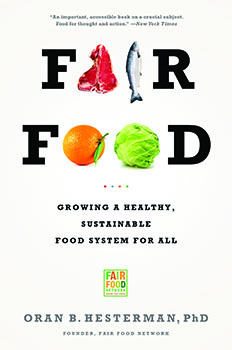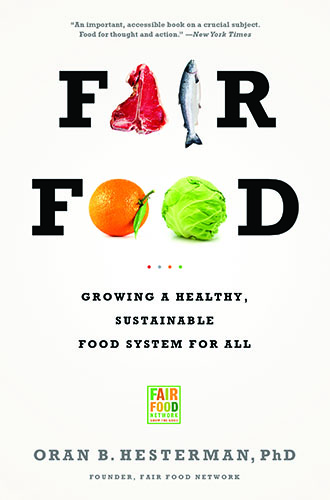With more than 35 years of experience as a scientist, farmer, philanthropist, businessman, educator, and passionate advocate, Oran B. Hesterman is a national leader in sustainable agriculture and food systems and is a respected partner for policymakers, philanthropic leaders, and advocates nationwide.
He is the founder and currently serves as president and CEO of Fair Food Network, a national nonprofit pioneering multi-win solutions that increase access to healthy food in our most underserved communities, support farmers, and stimulate economic activity. In just five years, Fair Food Network’s signature program, Double Up Food Bucks, has become a national model for healthy food incentives.
Hesterman’s 2011 book, Fair Food: Growing a Healthy, Sustainable Food System for All, provides an inspiring guide to changing not only what we eat, but how food is grown, packaged, delivered, and sold. Fair Food was heralded by The New York Times as “an important, accessible book on a crucial subject” and is required reading at more than 25 colleges and universities across the country.
Before launching Fair Food Network, Hesterman led the W.K. Kellogg Foundation’s Integrated Farming Systems and Food & Society programs, during which time he seeded the local food systems movement with more than $200 million in investments. Prior to his work in philanthropy and nonprofits, Hesterman researched and taught forage and cropping systems management and sustainable agriculture at Michigan State University.
A former fellow in the Kellogg National Fellowship Program and the National Center for Food and Agriculture Policy in Washington, D.C., Hesterman has published more than 400 reports and articles on subjects ranging from crop rotation to the impact of philanthropy on food systems practice and policy and trends in the good food movement. He currently serves on the board of a number of national and Michigan-based organizations including FoodCorps, Hazon, and Michigan Land Use Institute.
Hesterman is a native of Berkeley, California. He earned his bachelor’s and master’s degrees from the University of California – Davis. He completed his Ph.D. from the University of Minnesota in agronomy, plant genetics, and businesses administration. He lives with his wife Lucinda Kurtz in Ann Arbor, Michigan, where he still gets his hands dirty in his garden and at the potter’s wheel.

We have a food system that is really reaching a crisis point, whether we look at symptoms of this broken system that are chemical runoff in our waterways, spiraling rates of obesity, the number of food deserts where people cannot access healthy fresh food, or concentration that puts 80% of all of our meat packing into the hands of four companies. FAIR FOOD: Growing a Healthy Sustainable Food System for All, is not a book primarily about the problems of our broken food system, it is a book about solutions.”
See MoreCNN: Oran Hesterman Interviewed by Dr. Sanjay Gupta
Speaking About his book Fair Food

